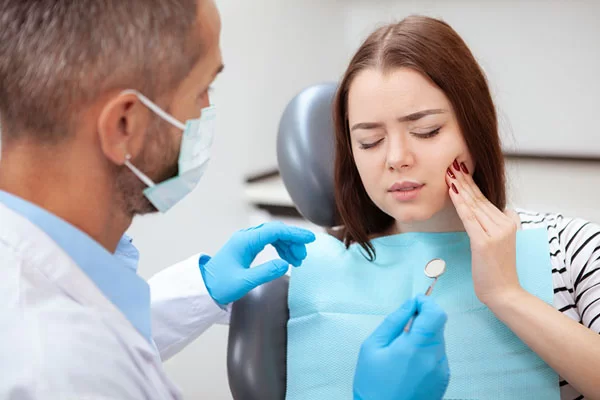Avoid Dental Bridge Complications with Your Trusted Dentist Near You in Farmington
When it comes to replacing missing teeth and restoring your smile, dental bridges remain one of the most popular and effective solutions available. These artificial teeth not only fill gaps in your smile but also improve chewing ability, maintain facial structure, and prevent surrounding teeth from shifting. However, like any dental procedure, dental bridges carry potential risks and complications that require careful consideration before undergoing treatment.
Ready to learn more? Contact our experienced dentist in Farmington today at (860) 470-3660 to schedule your consultation. We’re proud to serve patients living in Plainville, New Britain, Hartford, and Newington, CT, with comprehensive restorative dentistry solutions!
Benefits of Dental Bridges: Why They’re a Leading Tooth Replacement Option
Before exploring dental bridge risks, let’s examine why these replacement teeth have become such a popular choice for patients with missing teeth. Here are some of the benefits of dental bridges:
- Restored Oral Function: Dental bridges allow you to chew hard foods comfortably and speak clearly, restoring normal oral function that’s essential for daily life.
- Natural Aesthetic Appeal: Modern dental crowns and artificial teeth blend seamlessly with your natural teeth, significantly boosting confidence in your smile and overall appearance.
- Prevention of Further Oral Health Issues: By filling the gap left by a lost tooth, bridges prevent adjacent teeth from shifting into the empty space, which can lead to bite alignment problems and jaw joint complications.
- Enhanced Durability with Modern Materials: With proper dental bridge care and excellent oral hygiene, modern dental bridges—especially those made with advanced zirconia materials—can last 15 to 20 years, offering exceptional long-term value.
- Cost-Effective Solution: Compared to dental implants, traditional bridges often require less invasive procedures and provide immediate results, making them accessible to more patients seeking tooth replacement.
Understanding Dental Bridge Risks and Complications: What Every Patient Should Know
Damage to Supporting Teeth and Abutment Complications
Traditional and cantilever dental bridges rely on adjacent teeth (abutment teeth) for support. To place the dental crowns that anchor the bridge, your dentist near you must reshape these healthy supporting teeth by removing some enamel. This fundamental aspect of the dental procedure permanently alters your natural teeth and can lead to several complications:
- Heightened Tooth Sensitivity: The reshaping process can cause patients to experience heightened tooth sensitivity to hot or cold foods, sweet beverages, or even air temperature changes. While sensitivity typically diminishes over time, some patients may experience persistent discomfort.
- Increased Risk of Tooth Decay: If the dental crowns aren’t properly fitted or if patients maintain inadequate dental hygiene, bacterial buildup can occur underneath the crowns. This creates an environment where decay can develop in the abutment teeth, potentially compromising the entire bridge structure.
- Structural Weakening and Fractures: The added stress of supporting replacement teeth can lead to cracks or fractures in the supporting teeth over time, especially when patients chew hard or sticky foods regularly.
Poor Fit and Bridge Failure Complications
An ill-fitting bridge can cause significant discomfort and lead to various oral health issues that may require additional dental treatments:
- Chewing Difficulties and Bite Problems: When dental bridges don’t align properly with your bite, patients may experience difficulty chewing hard foods, jaw pain, or even jaw joint problems that affect overall oral function.
- Bridge Loosening and Cement Failure: Over time, the dental cement holding the bridge may weaken due to normal wear, bacteria buildup, or poor oral hygiene, causing the bridge to loosen or fall out completely.
- Gum Irritation and Tissue Damage: A poorly designed bridge can create constant irritation to the surrounding gums and soft tissues, leading to inflammation, soreness, and potential recession of the gum line.
If you’re experiencing any of these symptoms, contact our skilled dentist in Farmington immediately at (860) 470-3660 for prompt evaluation and treatment.
Gum Disease and Periodontal Complications
Traditional dental bridges can significantly increase the risk of gum disease if patients don’t maintain excellent oral hygiene. The design of bridges creates areas that are challenging to clean, leading to:
- Gingivitis Development: Early-stage periodontal disease characterized by red, swollen, or bleeding gums around the bridge area. This condition develops when inadequate dental hygiene allows plaque and bacteria to accumulate.
- Advanced Periodontitis: Without proper intervention, gingivitis can progress to advanced periodontal disease that damages the supporting bone and tissues. This serious condition can compromise not only the bridge but also the health of the remaining teeth.
- Receding Gums and Root Exposure: Poor oral hygiene or an ill-fitting bridge can cause gums to recede, exposing the roots of abutment teeth and increasing sensitivity to hot or cold foods while creating aesthetic concerns.
Bone Loss and Structural Changes
Unlike dental implants that stimulate the jawbone, traditional bridges don’t provide the same level of stimulation to the underlying bone structure. When a tooth is missing, the jawbone in that area no longer receives the natural stimulation from chewing forces, leading to bone resorption:
- Jawbone Weakening: Reduced bone density in the area where the tooth was lost may affect the long-term stability of surrounding teeth and overall oral health.
- Facial Structure Changes: Significant bone loss can cause a sunken appearance in the face, particularly noticeable in older adults or patients who have had missing teeth for extended periods.
- Impact on Adjacent Teeth: As bone loss progresses, it can affect the stability and health of the teeth on either side of the gap, potentially leading to further complications.
Infection and Abscess Formation
Bacteria buildup under or around the bridge due to poor oral hygiene or an improper fit can lead to serious infections requiring immediate dental intervention:
- Pain and Swelling: Persistent pain, swelling, or tenderness near the bridge site often indicates a developing infection that requires prompt treatment from your dentist.
- Bad Taste and Odor: An infection may cause a persistent foul taste in your mouth or chronic bad breath that doesn’t improve with regular brushing and flossing.
- Abscess Formation: In severe cases, a dental abscess may develop, creating a pocket of pus that requires immediate professional treatment to prevent the infection from spreading.
Modern Material Advantages and Aesthetic Considerations
While traditional bridges may present aesthetic challenges over time, modern dental bridge materials, particularly multi-layered zirconia, now offer improved color transition and enhanced translucency that better mimics natural teeth:
- Color Matching Challenges: Traditional bridge materials may not maintain the same shade as your natural teeth over time, especially if surrounding teeth undergo whitening treatments or natural color changes.
- Gum Recession Effects: When gums recede around certain types of bridges, metal frameworks may become visible, creating an unappealing appearance that affects smile confidence.
- Material Evolution: Modern zirconia ceramics offer superior biocompatibility and excellent mechanical strength while closely mimicking the appearance of natural teeth, reducing many aesthetic concerns associated with older bridge materials.

Who Faces Higher Risk for Dental Bridge Complications?
Certain factors significantly increase the likelihood of complications with dental bridges, and understanding these risk factors helps patients and dentists make informed decisions:
- Inadequate Oral Hygiene: Patients who don’t maintain good oral hygiene through regular brushing, flossing regularly, and professional cleanings face dramatically higher risks of decay, gum disease, and bridge failure.
- Pre-Existing Dental Issues: Individuals with untreated cavities, existing periodontal disease, or weakened teeth may experience higher complication rates and should address these issues before undergoing treatment.
- Bruxism (Teeth Grinding): Patients who grind or clench their teeth put excessive pressure on dental bridges, leading to accelerated wear, damage, or complete failure of the restoration.
- Systemic Health Conditions: Medical conditions like diabetes, autoimmune disorders, or osteoporosis can impair healing processes and increase infection risk, requiring special considerations during treatment planning.
- Tobacco Use: Smoking or using other tobacco products significantly compromises gum health, impairs healing, and increases the likelihood of complications arising after bridge placement.
- Age-Related Factors: Older patients may face additional challenges due to changes in bone density, gum health, or medical conditions that affect oral health and healing capacity.
Preventing Dental Bridge Risks
To protect your dental bridge and avoid complications, maintain excellent oral hygiene by brushing twice daily with fluoride toothpaste, flossing with bridge-friendly tools, and using antimicrobial mouthwash. Visit your dentist every six months for professional cleanings and checkups.
Choose an experienced restorative dentist who offers modern materials like zirconia and develops a treatment plan tailored to your needs. After placement, follow all care instructions—avoid hard or sticky foods during healing, take prescribed medications as directed, keep follow-up appointments, and promptly report any issues to ensure lasting results.
Frequently Asked Questions
If your bridge becomes loose, contact our Farmington dental office immediately at (860) 470-3660. Avoid chewing on that side of your mouth, and keep the bridge safe if it falls out completely. Our experienced dentist will evaluate the situation and determine whether the bridge can be recemented or if replacement is necessary.
Watch for warning signs such as persistent pain around the bridge area, heightened tooth sensitivity to hot or cold foods, gum swelling or tenderness, difficulty chewing, or changes in your bite. If you experience any of these symptoms, schedule an immediate appointment with our dentist near you for a thorough examination and treatment.
Yes! Our skilled dentist in Farmington specializes in restorative dentistry and takes a preventive approach to dental bridge placement. We use advanced diagnostic techniques and modern materials to minimize risks and ensure optimal outcomes for all our patients in the Greater Hartford area.
Yes, complications can develop as bridges age due to normal wear and tear, changes in the supporting teeth or gums, or inadequate oral hygiene. This is why regular dental visits with our Farmington team are crucial for identifying potential issues early and extending the lifespan of your dental bridge.
Take the Next Step: Schedule Your Consultation with Our Farmington Dental Team
Dental bridges effectively replace missing teeth, but their success relies on careful planning, skilled execution, and ongoing care. Understanding potential risks allows you to make informed decisions about your oral health.
Ready to explore tooth replacement options? Contact our experienced dentist in Farmington at (860) 470-3660 to schedule a consultation. We’ll assess your needs, discuss available options, and create a personalized treatment plan focusing on your long-term health and satisfaction.
Your perfect smile is within reach—take the first step toward a healthier, more confident you with our trusted local team! We’re proud to serve Farmington, Plainville, New Britain, Hartford, and Newington, CT, with comprehensive restorative dentistry solutions.
